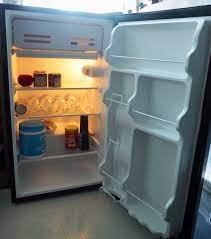Mini fridges are a popular choice for those needing compact and convenient cooling solutions, whether in dorm rooms, offices, or even as an extra storage space for beverages in home bars. However, a common question we receive here at TheKitchenApplianceDad.com is whether it’s safe and efficient to leave a mini fridge running continuously. In this post, we’ll delve into the practical aspects of operating your mini fridge around the clock, covering everything from safety concerns to energy efficiency and maintenance tips.
Before deciding to run your mini fridge 24/7, it’s important to understand how these appliances work. Unlike their larger counterparts, mini fridges are designed with size and convenience in mind, which can impact their cooling mechanisms and energy use.
Mini fridges typically operate using either a compressor or thermoelectric cooling system. Compressor-based mini fridges work much like standard refrigerators, using a vapor compression cycle to cool the interior. Thermoelectric mini fridges, on the other hand, use a Peltier effect to create a temperature difference, which is less common but offers quieter operation.

The primary concern when running any appliance continuously is safety. Fortunately, modern mini fridges are designed to be safe for long-term use.
One of the main risks associated with continuous operation is overheating. Ensure your mini fridge has adequate ventilation space around it, typically about a few inches on each side and at the back, to prevent overheating which can lead to component failure or, in extreme cases, fire hazards.
Always use a grounded outlet and avoid using extension cords with your mini fridge. If you must use an extension cord, opt for a heavy-duty one that can handle the appliance’s power requirements.
Running a mini fridge non-stop raises questions about energy consumption and the impact on your electricity bills.
The energy efficiency of mini fridges has improved significantly over the years, thanks to advancements in technology and stricter energy standards. Many newer models are Energy Star rated, indicating they meet or exceed federal guidelines for energy efficiency. You can check the Energy Star website for more details on specific models.
The cost of operating a mini fridge continuously will depend on its size, model, and your local electricity rates. On average, mini fridges use between 55 and 85 watts of power, which translates to about 1.3 to 2 kWh per day, or approximately $50 to $80 per year in electricity costs.
To ensure your mini fridge operates efficiently and safely over long periods, regular maintenance is crucial.
Keep the interior and exterior of your mini fridge clean. Remove any spills or stains promptly to prevent odors and maintain hygiene. The exterior should be wiped down regularly to keep the appliance looking its best.
If your mini fridge is not frost-free, you’ll need to defrost it manually to prevent ice buildup, which can impair the efficiency of the fridge. How often you need to defrost will depend on the model and humidity levels, but generally, this should be done whenever the frost exceeds a quarter of an inch thick.
The door seals (or gaskets) are critical for maintaining the efficiency of your fridge. Check them periodically for wear and tear and replace them if they become loose or damaged to keep the cold air in and the warm air out.
Ensure the vents of your mini fridge are not blocked by dust or debris, which can impede airflow and cause the appliance to work harder, reducing its lifespan.
While it’s generally safe to leave your mini fridge on all the time, there are instances when turning it off makes sense:
By understanding these factors, you can confidently decide whetherleaving your mini fridge running 24/7 is the right choice for your needs. Whether for convenience or necessity, a mini fridge can be a great asset as long as it’s used wisely and maintained properly. At TheKitchenApplianceDad.com, we’re here to help you make the most of your kitchen appliances, ensuring they serve you well while keeping safety and efficiency in mind. Happy cooling!

